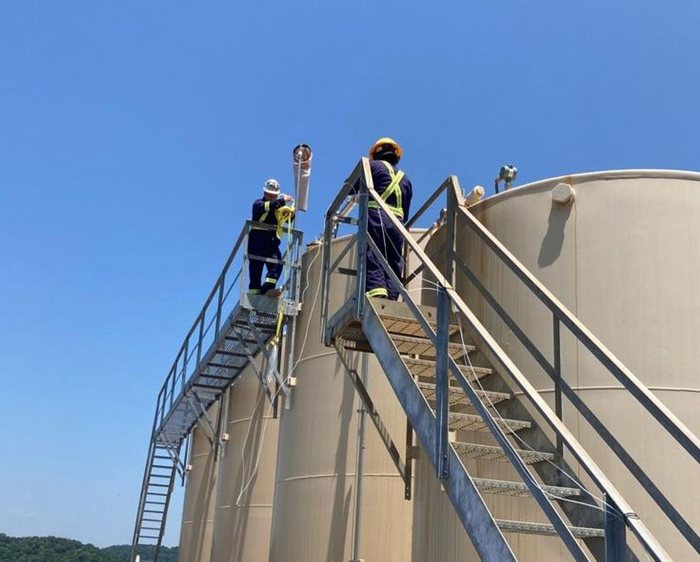Over the next three years, researchers with the West Virginia University Center for Alternative Fuels, Engines and Emissions will try to gain a robust understanding of where and why leaks of methane and other gases happen and their effects on local air quality and global climate.

Credit: WVU Photo
Over the next three years, researchers with the West Virginia University Center for Alternative Fuels, Engines and Emissions will try to gain a robust understanding of where and why leaks of methane and other gases happen and their effects on local air quality and global climate.
With the support of $5.5 million in U.S. Department of Energy funding, the project, led by Derek Johnson, associate professor at the Benjamin M. Statler College of Engineering and Mineral Resources, will focus on methane emissions — a planet-warming greenhouse gas — from liquid storage tanks across West Virginia, Pennsylvania and Ohio.
Dubbed STEAM TANKS, Storage Tank Emissions Assessments in the Marcellus to Acquire New Knowledge with Science, the study will measure methane and other volatile organic compounds and hazardous air pollutants emitted from liquid storage tanks located “upstream” at extraction sites as well as “midstream” at various sites along the routes that oil and gas take on their way to refining and processing facilities.
“Methane is the second most emitted greenhouse gas in the U.S. after carbon dioxide,” Johnson said, adding that methane is also 28 times more potent than carbon dioxide at trapping heat in the atmosphere. Atmospheric methane concentrations have more than doubled over the last 200 years, with gas and petroleum systems constituting the second largest source of U.S. methane emissions after the agriculture sector.
Natural gas is made up primarily of methane, and when both gas and crude oil are produced, processed, transported and stored, methane emissions may leak into the air, offsetting some of the lower carbon benefits of natural gas.
Johnson pointed to liquid storage tanks in particular as “complex systems.” Tanks may be vented to the atmosphere or to emissions control devices. They may lose gases when they are drained or filled, he explained, and when they simply “breathe” day in and day out, due to natural changes over time in tank temperature and pressure. And tanks that use control devices may have leaking seals, vents or thief hatches that produce emissions.
“Tank emissions and leak rates have been highly variable for methane and other volatile organic compounds, so we need a better understanding of their activity. Then we can improve models for predicting emissions and ultimately develop solutions to mitigate them,” Johnson said.
“We’ll work with site operators to document factors that can contribute to methane emissions: temperatures and pressures, production and throughput, internal chemical composition of liquid and vapor phases, as well as factors such as open or damaged valves, hinges or seals.”
Once CAFEE has completed an initial regional inventory of oil and gas storage tanks, the team will deploy tools and technologies that range from mobile laboratories for sampling the air to advanced machine learning methods for accurately predicting methane and other emissions over time. In addition to capturing a year of emissions measurements from selected key tanks, the researchers will conduct short-term emissions monitoring at a minimum of 100 sites, each of which may have multiple storage tanks.
Most will be locations associated with newer unconventional gas production operations, but at least 30 sites focus on conventional operations. The data collected will answer questions such as whether current prediction tools and emissions factors are accurate or representative.
After acquiring data on conditions and emissions at multiple sites, Johnson and his colleagues will start updating decades-old software models for predicting emissions and begin developing new tools for reporting leaks.
WVU researchers on the team are Gregory Thompson, associate professor; Scott Wayne, associate professor; Madelyn Ball, assistant professor; Hailin Li, professor and Nigel Clark, professor emeritus and current consultant at Transport Energy Strategies.
“WVU will leverage the expertise of partner Aerodyne Research in plume sampling,” Johnson said. “Our team is currently partnering with three industry leaders and seeking additional industry participants from across the greater Appalachian basin.”
Practicality is a priority, so in addition to ensuring the sensors being evaluated would be cost effective for industry to implement, CAFEE will conduct local analyses of how their findings could affect job and training opportunities in communities. If the research shows a need to outfit storage tanks with instruments, Johnson predicted industry may need to invest in an expanded labor force — third-party emissions auditing or reporting companies, for example, or new maintenance and repair technicians.
“Cutting methane emissions is important — it’s perhaps one of the fastest ways to help curb climate change,” he said. “But there isn’t much research directly quantifying the methane emissions associated with upstream and midstream oil and gas tanks. As an example of how much is unknown, until recently no one was considering one type of tank, the ‘produced water’ storage tank, in terms of methane emissions at all, even though we have shown that emissions from those kinds of tanks may be substantial.”
Johnson said he believes the project has the potential to generate findings with impact on national and global practices and technologies.
“This research is pivotal to developing a deeper understanding of tank emissions of methane and other gases, so that industry can develop best practices or deploy technologies for reducing those emissions.”




